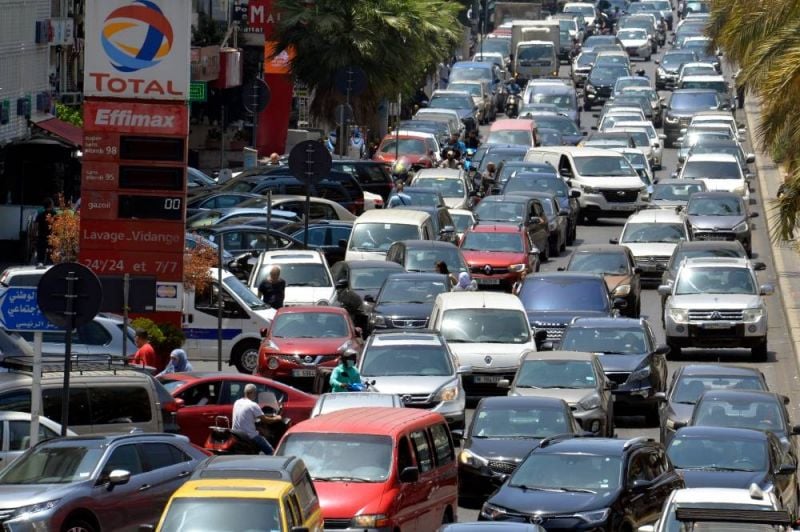
Traffic is clogging streets throughout the country as a fuel shortage is forcing drivers to queue for extended periods to gas up. (Credit: Hussam Shbaro)
Want to get the Morning Brief by email? Click here to sign up.
The lira fell to a new record low against the dollar, as economic grievances sparked small-scale protests in some areas. The national currency, which has depreciated more than 15 percent of its value since the end of May and 90 percent since 2019, was selling and trading at LL15,500 to the US dollar on the parallel market. Demonstrators took the streets in multiple areas, blocking Elia Square in Saida and the Al-Nour and Pistachio roundabouts in Tripoli with burning tires in protest against deteriorating living conditions and shortages of basic necessities.
Gas station lines may ease slightly after Banque du Liban approved credit lines to fund subsidized fuel imports. Following the approval, some 12 million liters of fuel — enough to meet demand for about half a week — were distributed on Monday, fuel importers said in a joint statement. The importers called for a sustainable solution to countrywide fuel shortages that have backed up lines at gas stations and clogged roads in recent weeks. BDL subsidizes 90 percent of the cost of fuel imports using its rapidly dwindling foreign currency reserves, which have neared the mandatory minimum level — currently equivalent to 15 percent of commercial banks’ dollar deposits. The central bank said on Friday that it will not use the mandatory reserves to fund fuel imports, urging officials to “take necessary measures.” Meanwhile, two sources confirmed to our sister publication, L’Orient-Le Jour, that BDL had paid for fuel for power generation, raising the average electricity supply to about eight hours per day.
Parliament’s Finance and Budget Committee convened on Monday in an attempt to fund ration cards. At the end of the meeting, which included caretaker Finance Minister Ghazi Wazni and the World Bank’s regional director, Saroj Kumar Jha, the committee’s chair, Ibrahim Kanaan, said the organization is ready to allocate about $1 billion to a cash transfer program for Lebanon’s poorest families. Caretaker Premier Hassan Diab has prepared a plan to replace the current subsidy program with ration cards for 750,000 of the country’s most vulnerable families — a solution that Diab claims would save the state about $3 billion annually. To avoid tapping into the mandatory reserves, the ration cards would be funded from several undisbursed loans that are worth about $959 million, Kanaan told L’Orient Today. Kanaan urged the caretaker cabinet to “move fast” to reallocate the undisbursed World Bank loans. Meanwhile, a $246 million loan to finance the country’s poorest families has been delayed for months due to the state’s inability to meet the World Bank’s prerequisites.
Michel Aoun called for the revival of negotiations to demarcate Lebanon’s southern maritime border with occupied Palestine after meeting with an American mediator. The last round of negotiations between Lebanon and Israel, in May, led to no progress after Beirut submitted new demarcation lines, adding about 1,400 square kilometers of water to the country’s claim — a precondition rejected by the US mediator, John Desrocher. According to a statement from the presidency, Aoun said on Monday, “Israel cannot impose a unilateral view on the course of the path of negotiations.” Officials have not scheduled a date for the next round of negotiations.
Parliament’s Administration and Justice Committee is set to meet at 11 a.m. to examine two long-promised laws. The committee will tackle a law that aims to install an independent and transparent judiciary and a capital control law that formalizes restrictions on deposits, withdrawals and transfers abroad, MP Bilal Abdallah told L’Orient Today. A subcommittee has finished drafting the judiciary reform bill, which is close to being approved by the entire committee before being sent to the full Parliament, Abdallah said, without providing further details on the timeframe. The bill comes as the country’s judiciary and political system face heightened public scrutiny for the ongoing failure to assign accountability for either the financial collapse or the Beirut port explosion.